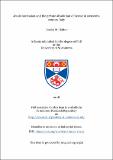Jesuit confession and the private absolution of heresy in sixteenth-century Italy
Abstract
This thesis offers the first extensive explanation of a unique papal privilege conceded to the Society of Jesus in 1551. This privilege allowed the new religious order to bring former heretics back into the Catholic Church in the absolute secrecy of sacramental confession. The thesis focuses on the use of this privilege on the Italian peninsula during the sixteenth century. There, the concession of the privilege was particularly remarkable as it conflicted with the jurisdiction of the Roman Inquisition, which had been established by Pope Paul III just a decade earlier. The Roman Inquisition used judicial processes to fight the spread of Protestant heresies in the Catholic heartlands. When popes throughout the sixteenth century granted Jesuits in Italy the privilege to absolve heresy, they gave the Society a jurisdiction that undermined their very own organ for stemming religious dissent.
This thesis traces the history of the privilege chronologically, using both normative documents and case studies reconstructed using material from the archives of the Society, Inquisition, papacy and temporal leaders. With this approach, the thesis corrects existing accounts of the privilege, which explain it according to the aims of individuals and institutions outside of the Society without integrating the objectives of the Jesuits who actually solicited the power. By incorporating all of these factors, the thesis offers the first detailed history of the privilege and uses that history to illuminate the early Society's relationships with the papacy and the Roman Inquisition, aspects of Jesuit history that have been subject to persistent mythologisation. By analysing the fluctuating pastoral and institutional priorities that dictated the course of the early modern Church, this thesis shows that the actions and interactions of three of the most important protagonists in early modern history - the Society, the papacy and the Inquisition - were characterised by a shared pragmatism, even if their priorities were only pushed into alignment by the crisis that the Church faced after the Protestant Reformation.
Type
Thesis, PhD Doctor of Philosophy
Rights
Embargo Reason: Embargo period has ended, thesis made available in accordance with University regulations
Collections
Items in the St Andrews Research Repository are protected by copyright, with all rights reserved, unless otherwise indicated.

